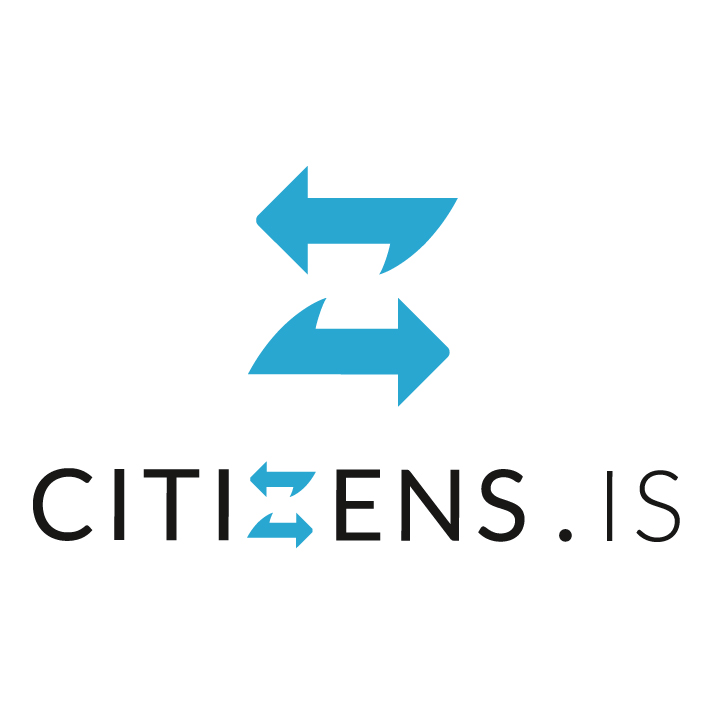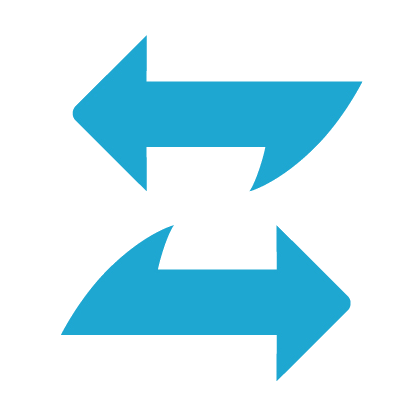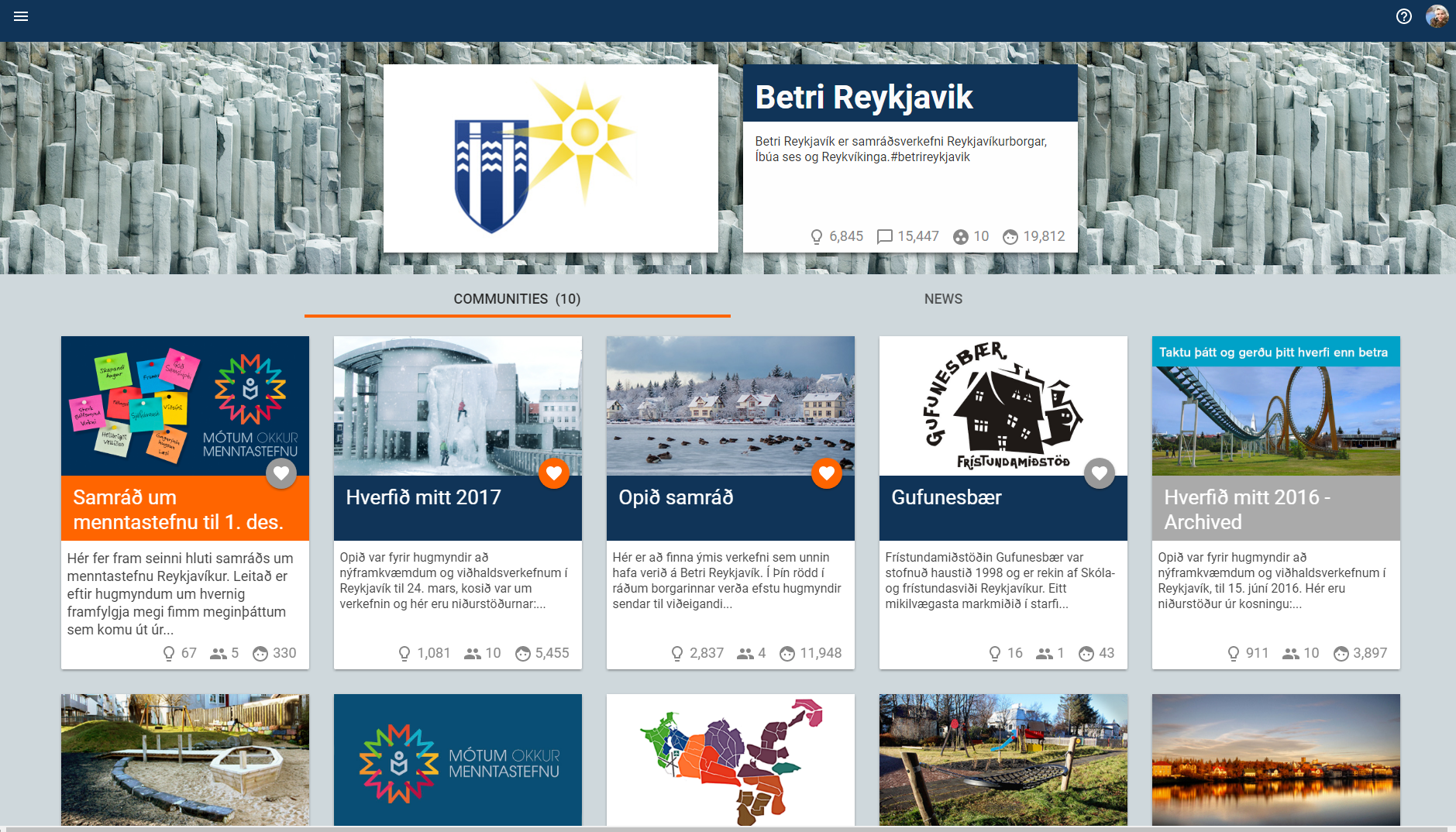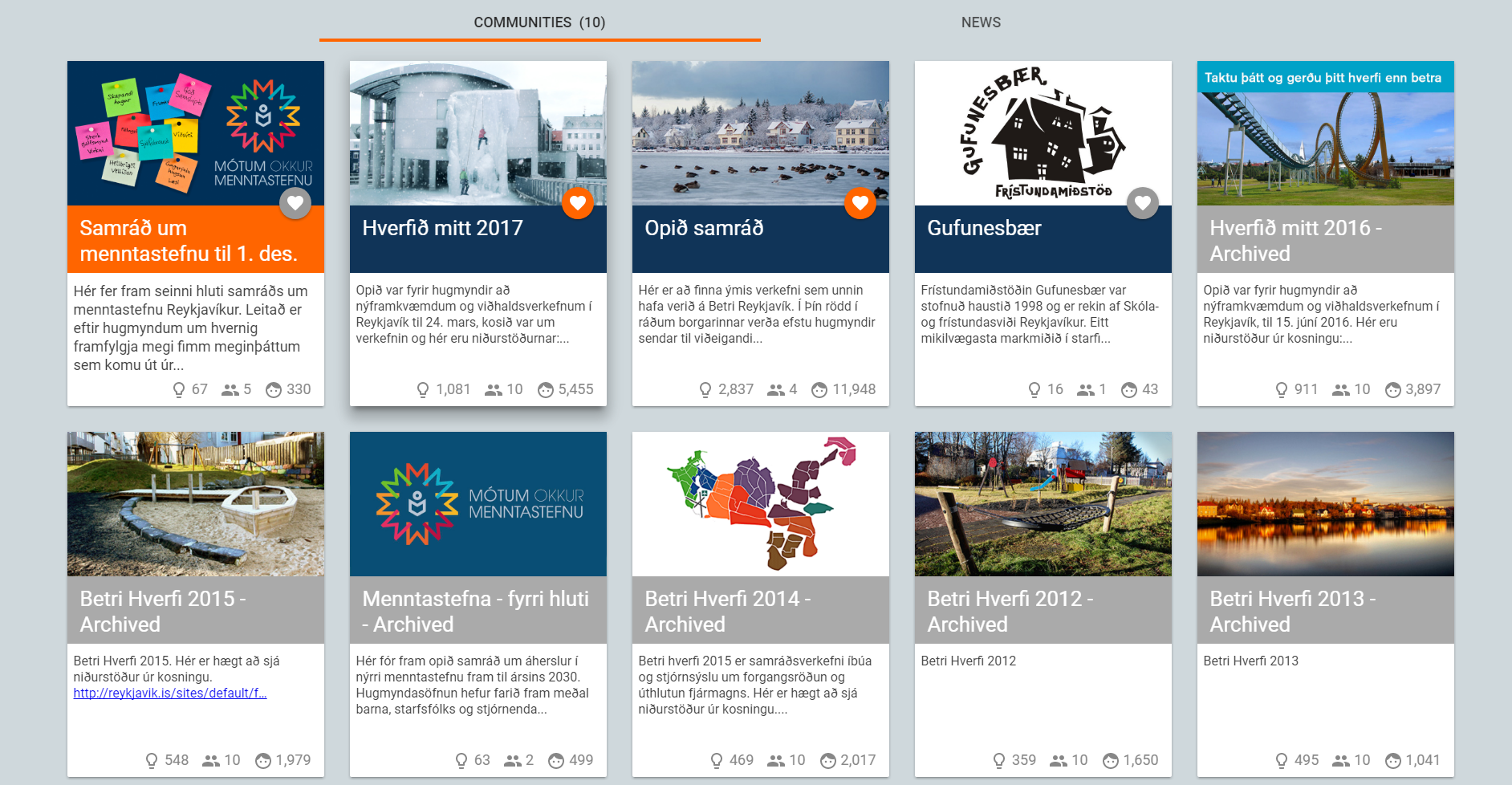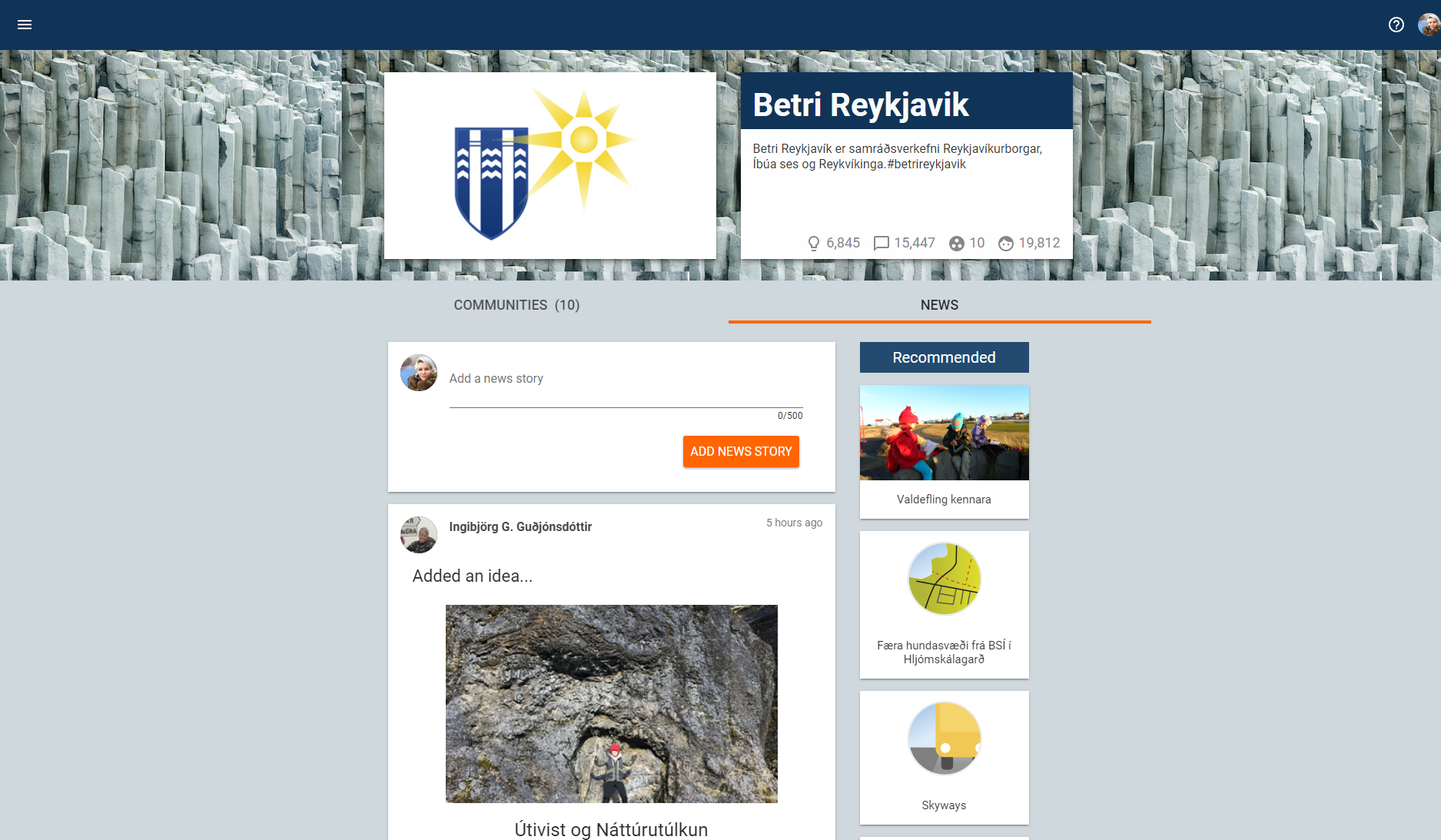Better Reykjavík
Timeframe:
25. May 2010 – Present
Project Description:
Better Reykjavik is an online platform for the crowdsourcing of solutions to urban challenges launched in May 2010. Better Reykjavik is a co-creation project of the Citizens Foundation, Reykjavik City, and its citizens that connects them and improves trust and policy. Innovations include a unique debating system, crowd-sourcing of content and prioritization, submission of multimedia content, and extensive use of AI to improve the user experience as well as content submitted.
It’s a platform for crowdsourcing solutions to urban challenges and has multiple democratic functions: Agenda setting, Participatory budgeting, and Policymaking. It opened a week before the 2010 elections in Reykjavik, just as the Best Party, a movement meant as a sarcastic critique of local politics, won the city elections; the new government saw the potential for crowdsourcing their platform immediately. After the elections, Better Reykjavik became an official policy and agenda-setting platform for the city.
Participatory budgeting
In 2011 a Participatory budgeting started within Better Reykjavik using the name Better Neighborhoods (later My Neighborhood). In this project, Reykjavik residents and the city administration maintain an ongoing collaboration to determine capital allocation for construction and maintenance projects within the ten main neighborhoods of the city.
Participation has increased steadily with new records reached almost every year. This 450 million ISK (4.2 million USD, 3.6 million EUR) participatory budgeting initiative enables the public to spend approximately 4% of the city’s capital investment budget.
Challenges Addressed
- A disconnection between the authorities and the citizens had surfaced brutally during and after the 2008 financial crisis which hit Iceland hard and government budgets were being cut.
- The strong will of regular citizens to be more involved in policy-making.
- A more complex city operation calls out for more direct feedback from citizens.
Key Outcomes: Citizens
- Mass participation. The numbers don’t lie; penetration into the urban society of Reykjavik is well over 50% with the program, excellent for this sort of digital civic engagement. Over 70,000 people have participated out of a population of 120,000 since the site opened and 30,000 registered users have submitted 10,000 ideas and 21,000 points for and against.
- As the name would imply, Better Reykjavik made better use of investment budgets available to the city planners than would have occurred were those planning the expenditures not had input from their constituents. Once citizens have experienced these new tools for engagement, there is a snowball effect, as the use of the platform inspires demands for more access to decision-making by the participants. In turn, this greater transparency on how money is spent and how decisions are made continues to help Reykjavik meet ever more complex demands for services while continuing to build trust between the government and its citizens.
- 798 citizen projects have been built or are being built from the $3.5m participatory budgeting project since 2011.
Key Outcomes: Government
- Collective intelligence contributes to better decisions and better use of public funds.
- Creates more trust on the issues being deliberated.
- Answers the call for renewal of democracy.
- Working towards UN dev goal 16.7 and inclusive decision-making.
Read more about Better Reykjavík projects
Your voice in the City Council
The website gave residents of Reykjavik the opportunity to submit original ideas and solutions to municipal-level issues within the city. Citizens of Reykjavik are given the opportunity to submit, debate, and prioritize policy proposals and ideas. Moreover, it allows residents to vocalize, debate, and amend a variety of ideas which they believe are crucial, and gives the voters a direct influence on decision making. 450 ideas have been processed through agenda setting part of Better Reykjavik. https://betrireykjavik.is
The main idea behind Better Reykjavik and its various projects is to connect citizens to the city administration to increase participation and awareness amongst citizens on municipal issues and to lessen the gap between on the one hand elected officials and administrative staff and the general public on the other hand. Better Reykjavik allows citizens to improve their city in a collaborative way by adding their ideas on how to improve the city, prioritizing them and collectively finding the best points for and against those ideas. The prioritization is done only by citizens and therefore eliminates the need for administrative staff work on prioritizing the ideas.
Participatory budgeting
In 2011 a Participatory budgeting started within Better Reykjavik using the name Better Neighborhoods (later My Neighborhood. There Reykjavik residents and the city administration collaborate to determine capital allocation for construction and maintenance projects within the ten main neighborhoods of the city. Participation has increased steadily with new records reached almost every year.
This 450 million ISK (4.2 million USD, 3.6 million EUR) participatory budgeting initiative enables the public to spend approximately 6% of the city’s capital investment budget. The process for My Neighborhood takes about a year. During a three-week span between February and March, the ideas from all 10 neighborhoods are collected, and from the end of the “idea collection” period to May, the ideas are processed by both the project management team and the political district committees to decide which ones are reasonable and implementable.Close to 700 ideas from citizens have been realized by the city, with the visible and usable results in all neighborhoods which have been made better for their citizens to enjoy. https://betrireykjavik.is/community/973
Our annual PB online voting has attracted participation of around 12.5% of the city’s population. In April 2019 the city has had just completed its 8th annual idea generation, with 39,000 visitors (37% of the voting population) and 5,800 logging in.
Close to 700 ideas from citizens have been realized by the city, making all neighborhoods better for citizens to enjoy. Over 450 ideas have been processed through agenda setting part of Better Reykjavik. The education policy project generated 200 ideas and thousands of debate points.
Crowdsourcing better education
Better Reykjavik has seen many more projects with most notable being used to crowd-source policy on education in Reykjavik schools. In 2017 the City of Reykjavík decided to crowdsource ideas to co-create the City’s education policy on Better Reykjavík. This was the first time that a specific policy of any government within Iceland was crowdsourced. The process is ongoing, having completed the first phase of prioritizing educational objectives. The education policy project generated almost 200 ideas and thousands of debate points. https://betrireykjavik.is/community/663 & https://betrireykjavik.is/community/725
Automatic translations, a unique debate system and other innovations
Better Reykjavik can be used in any language available in Google Translate by translating between languages, which works very well. This means that you can add and view content in the language of your choice.
There are many innovative elements within the Better Reykjavik platform and one of the reasons for its success and general acceptance is it’s unique debate system which is based on users adding talking points and arguments for and against ideas instead of the traditional comment section which often goes into heated arguments and name callings with seldom useful content which deters most people from participating but encourages extreme views and words. This debate system has been a part of Better Reykjavik since its inception.
Better Reykjavik incorporates a Up/Down ‘voting’ system where users vote up and down not only ideas but also debate points from other users which results in a system that, without moderation or other administrative efforts, presents the city with a list of ideas that are prioritized by its users. But not only that but also with the best points (according to its users) for and against each idea. This makes it very easy for the city to evaluate which ideas are good and which not as they’re in fact evaluated by the citizens.
Other notable innovative elements are the possibility to use video and audio to record your ideas and debate points. This method attracts users that otherwise might hesitate to participate. This benefits both the city and its citizens as their opinions and expertise used to improve the city. This content is automatically transcribed to text. Better Reykjavik uses Artificial Intelligence to recommend ideas and do smart notifications and a toxicity sensor to alert admins about abusive content although our debate system makes this rare. There is also automatic classification of ideas and a toxicity sensor which alerts admins about abusive content, although as said before, our debate system makes this a rare occurrence.
Inspiring others around the world
Better Neighborhoods has inspired many of the biggest towns in Iceland to do similar projects, including Kópavogur, Garðabær, Mosfellsbær and others. All those projects have been successful and are repeated regularly. Better Reykjavik’s agenda setting project, My voice at the City Council, has also been replicated in other towns and municipalities such as Hafnarfjörður, Fljótsdalshérað and Stykkishólmur.
Better Reykjavik and My Neighborhood were inspirations for the Decide Madrid project where we consulted for them. The Norwegian Consumer agency uses Your Priorities to connect with the public in Norway to help them prioritize their work. It’s used to crowdsource questions to the government from two majority parliamentarians and for projects in Scotland, Norway, Hungary, Slovenia, Croatia and in the Estonian Rahvakogu (People’s Assembly) in 2013 resulting in law and policy changes. Our open source software & services have been officially used in over 20 countries since 2010.
Visit Project
Date
6 May 2010
